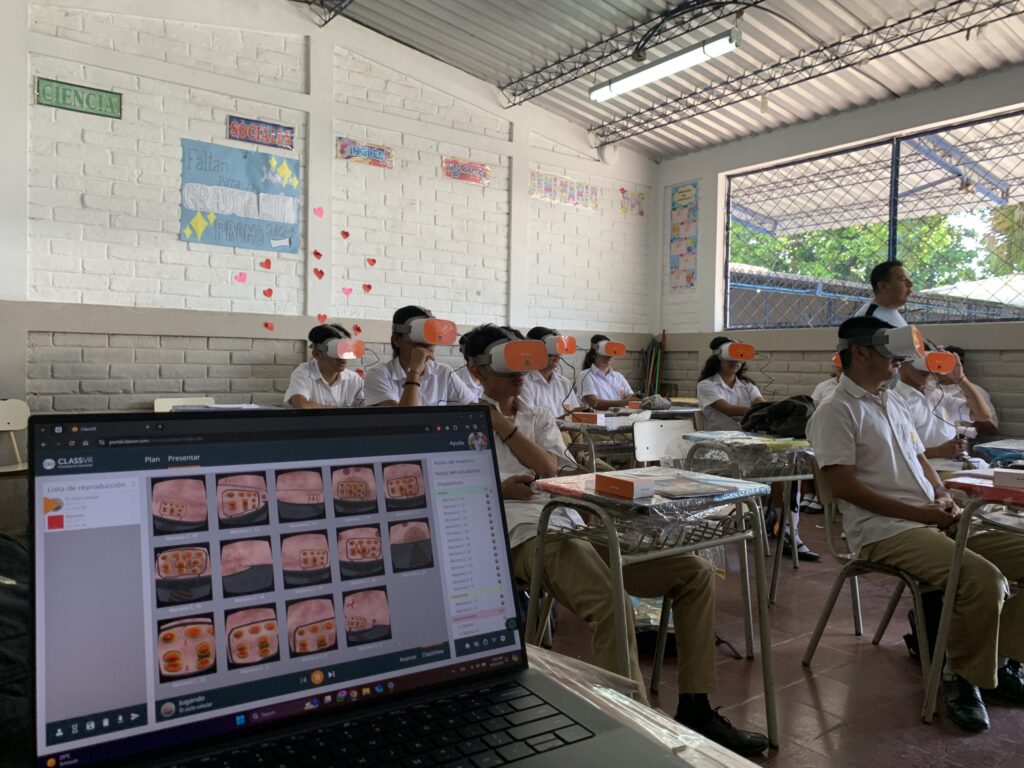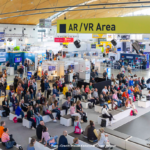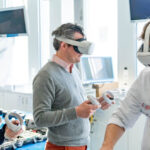A recent quantitative study conducted by VR Latam and FEPADE explored how Virtual Reality (VR) technology can enhance learning experiences for students in vulnerable public schools across El Salvador.
The study focused on the use of ClassVR in science classes and measured its impact on student motivation and content retention. Following a successful 2023 pilot, the initiative scaled in 2024 to include 32 public schools, most located in rural areas with limited access to technology.
The research findings presented here are based on a focused study conducted in 7 of those schools, involving 317 students aged 14 – 18 years old.
Using Virtual Reality to Support Knowledge Retention and Motivation
This study assessed the effects of VR-based science lessons using a pretest-posttest control group model. Students were divided into two groups:
- The target group used ClassVR headsets to explore science content in immersive formats.
- The control group received instruction through traditional classroom methods, without any additional technological or audiovisual elements.
Assessing the Impact: Pre and Post-Test Methodology
Changes in knowledge retention were measured through a 36-question questionnaire, administered both before and after the intervention. The questions aligned with ten science topics covered during the study, offering a clear benchmark for evaluating learning gains.
To assess student motivation, researchers used the Instructional Materials Motivation Survey (IMMS), a tool grounded in John Keller’s ARCS model of motivation (Attention, Relevance, Confidence, Satisfaction). This survey was also administered before and after the learning period to both groups, using a 5-point Likert scale to quantify shifts in motivation.
The surveys were conducted at two key points initially, during the first week of the programme, before any lessons were delivered, to establish a baseline. The same tests were then repeated one week after the final lesson, with the target group using VR and the control group using traditional methods. This allowed researchers to measure both immediate learning gains and longer-term retention, as well as track changes in student motivation.
Implementation Approach
Each participating institution was equipped with a fully operational ClassVR laboratory, which included 24 headsets and access to ClassVR’s curated library of immersive educational content. In addition, teachers received 16 hours of in-person training focused on content design and the integration of VR into classroom instruction, to ensure consistency and scalability.
To support the rollout, the initial classes were co-facilitated by VR Latam’s team, offering hands-on technical assistance and pedagogical guidance. Teachers followed standardised lesson plans aligned with El Salvador’s national curriculum, ensuring that the technology was used confidently and consistently across all schools involved in the study.

Key Results
Knowledge Retention
The target group, who learnt with VR, demonstrated a significant improvement in learning outcomes:
- Retention scores increased by 35.2% in the VR group.
- The control group showed a minor improvement of 2.66%.
These results were consistent across all science topics tested, with the most notable gains in abstract areas such as electric charge and Coulomb’s Law.
Student Motivation
Motivation scores were maintained or slightly improved with the use of VR:
- Satisfaction scores increased from 4.21 in the pre-test to 4.28 in the post-test.
- Attention scores increased from 3.97 in the pre-test to 4.11 in the post-test.
- Relevance scores increased from 4.20 in the pre-test to 4.23 in the post-test.
In contrast, the control group experienced declines in all three subscales. This suggests that immersive learning helps sustain student engagement, even during periods when motivation typically decreases
Highlights
- Students using VR were more focused and engaged in class.
- Retention of complex science content improved significantly.
- Motivation was sustained across attention, relevance, and satisfaction.
Jessica Lozano, a science and technology teacher at República de Italia’s School, said: “The experience with virtual reality headsets for the students was very beneficial and exciting. Allowing our students to explore places and cultures they might never visit, as well as showing them the human body in detail, has been truly valuable.”
This study demonstrates how immersive technology can enhance both cognitive and emotional aspects of learning in public education systems. When introduced with appropriate training and curriculum support, ClassVR can offer a scalable way to improve motivation, retention and engagement, especially in rural and vulnerable communities.
To access the full research paper, click here.
Quelle:


